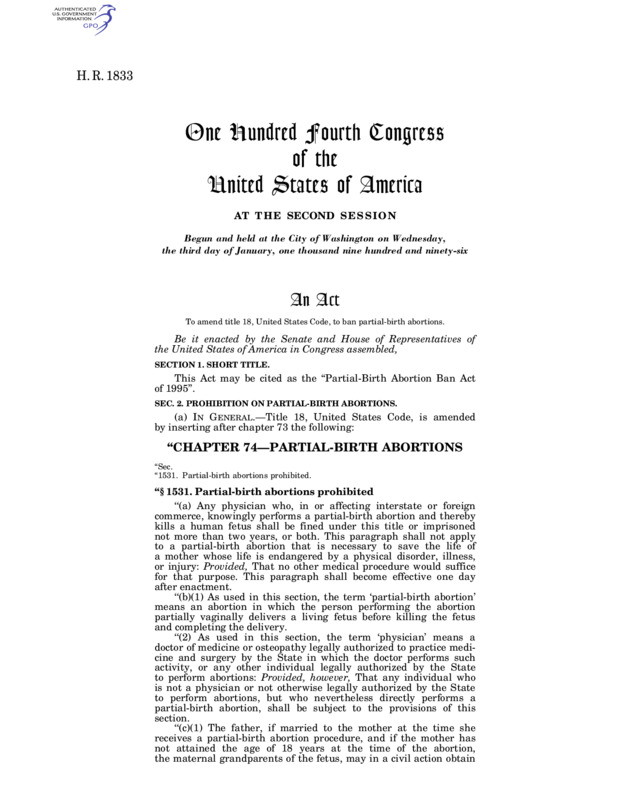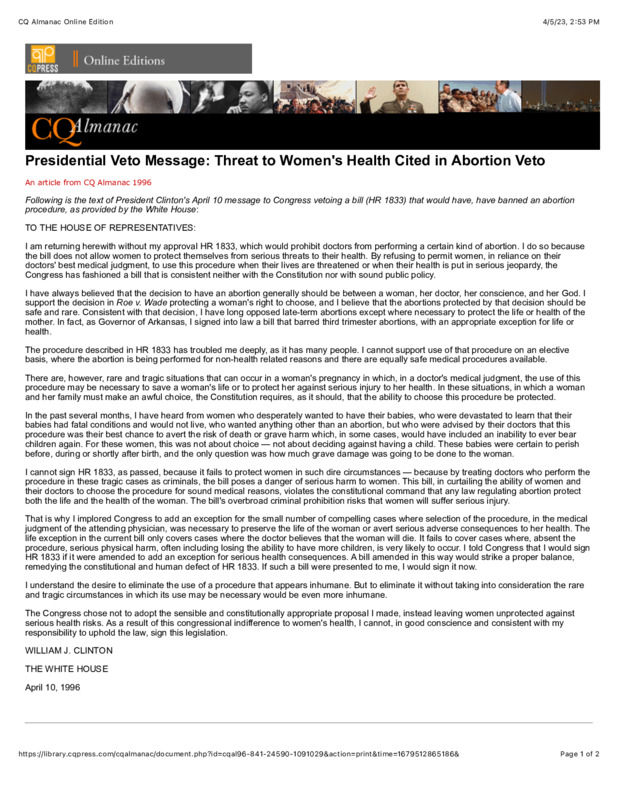PBA Ban Act of 1995
This exhibit serves as the foundation for our project and the beginning of our thesis. H.R. 1833 (Item 1) was the proposed bill to ban Partial Birth Abortion (PBA) in 1995. The bill passed through both the House and the Senate to then be vetoed by President Clinton in 1996. Clinton in his presidential veto message (Item 2) voiced his concerns and reasons for vetoing H.R. 1833. Later that year, congress held a congressional debate (Item 3) spurred by pro-life representatives to bring H.R. 1833 back to the forefront of their political agenda. Both President Clinton and various Representatives utilized religious reasoning for or against the veto of H.R. 1833. Partial Birth Abortions remained a “hot-button” issue amongst politicians and the American people through the bill’s introduction, veto, and post-veto future.
Sponsored by Florida Republican Representative Charles T. Canady, H.R. 1833 was introduced to the 104th Congress on June 14th 1995. H.R. 1833 (Item 1) is otherwise known as the Partial-Birth Abortion Ban Act of 1995. Brought on by the recent popularity of the D&X procedure from Dr. Martin Haskell’s paper, Canady introduced this bill to a Republican controlled House and Senate. H.R. 1833 prohibited (A) any physician to knowingly perform a partial-birth abortion except where such abortion is necessary to save the life of a mother provided that no other medical procedures would suffice. If the physician performs a PBA, they “shall be fined under this title or imprisoned not more than two years, or both” [1]. Under H.R. 1833, a “physician” refers to a “doctor of medicine or osteopathy legally authorized to practice medicine and surgery by the State in which the doctor performs such activity.” If an individual performs a PBA who does meet the defined physician in H.R. 1833, they “shall be subjected to the provisions of this section.” Within H.R. 1833, a PBA is referred to as “an abortion in which the person performing the abortion partially vaginally delivers a living fetus before killing the fetus and completing the delivery.”
H.R. 1833 passed in the House on November 1st 1995 with 288 Yeas and 139 Nays. On December 7th 1995, H.R. 1833 passed in the Senate with amendments by a 54-44 Yea-Nay vote. On March 27th, 1996, the House agreed to the Senate amendments and on April 5th 1996, H.R. 1833 was presented to President Clinton. Clinton vetoed H.R. 1833 on April 10th 1996. The House overrode the President’s veto with a 285-137 Yea-Nay vote, but the Senate failed to have the needed ⅔ majority. Clinton’s reasoning for vetoing H.R. 1833 was given to Congress on April 10th 1996 following the veto (Item 2). Clinton cites that the inability for a physician to perform a PBA denies women the ability to protect themselves when their “lives are threatened or when their health is put in serious jeopardy” makes H.R. 1833 neither constitutional or “sound public policy” [2]. Clinton states, “I have always believed that the decision to have an abortion generally should be between a woman, her doctor, her conscience, and her God”. Clinton then goes on to say that he vetoed the bill because it lacked the exception that PBA can be performed when “necessary to preserve the life of the woman or avert serious adverse consequences to her health”. The proposed H.R. 1833 bill had an exception that physicians could perform a PBA if they believed the woman was going to die.
The language used in President Clinton’s message to Congress was one that would echo the foreseeable future of PBA. His belief that God should be included in the decision for a woman to have a PBA will permeate the argument to ban PBA. Such language is seen in Congress on September 19, 1996. Led by Rep. Charles T. Canady, Congress heard the arguments in favor of banning PBA in a move to discharge the Committee in the Judiciary from the further consideration of the President’s veto of H.R. 1833. Canady begins by stating that President Clinton is “the one person standing in the way of Congress saving thousands of children from being partially delivered and then killed with an abortion procedure that has shocked the conscience of the American people” [3]. Delegating time to their fellow representatives, Rep. Canady and Rep. Schroeder oversaw the congressional meeting. Given 2 ½ minutes by Schroeder, democrat Rep. Jackson-Lee of Texas voiced her opinion against H.R. 1833. Her reasoning to sustain the veto for H.R. 1833 is as follows: “I am pained now to be on the floor of the House because Republicans have made a medical procedure now a political cause. I am pained because I personally know the pain of praying for a fetus to survive and it did not. I am glad I had the support of my God, my doctor, and my family. I believe the Americans are praying people, who believe in the right to privacy in this most difficult and private matter” [4]. As a Seventh-Day Adventist, Jackson-Lee is a Protestant Christian who advocated for PBA [5]. Per her statement, Rep. Jackson-Lee believes that PBA is a medical issue --not a political one-- that should be decided by the woman’s family including her spiritual leader and God.
Later on in the debate, democrat Rep. Robert Wise from West Virginia supported Rep. Schroeder by stating, “I cannot believe that when a mother’s health is seriously endangered this Congress would stand between the mother, her family, and her God” [6]. Directly following Rep. Wise was republican Rep. Stearns of Florida. Stearns voiced a completely different attitude regarding God and PBA. His emotional and fiery speech (Item 3) called on the 5th Commandment “Thou shall not kill” as a main part of his argument. Later in his speech, Stearns quoted Mother Teresa, a Catholic nun and saint, stating, “the greatest destroyer of peace is abortion. Because if a mother can kill her own child, what is left? For me to kill you and you to kill me. There is nothing in between” [7]. Responding to Rep. Stearns, Rep. Lloyd Doggett of Texas shamed the Republican party of bending the facts, “it is a deplorable and cynical move that the sponsors of this measure engage in to exploit the very deeply held and genuine religious convictions of millions of Americans. If anyone, no matter how religious and how committed on this issue, really believes the opening statement of the gentleman from Florida [Mr. Canady] that there are thousands of babies across this country that are being stabbed to death moments before they are born into this world, then I would say to all these anti choice Republican militants, ‘the blood is on your hands here after President Clinton wisely vetoed your bill on April 10’” [8]. Dogget then goes on to criticize the Republican party for only caring about political advantages rather than women's health.
1. Congress.gov. "H.R.1833 - 104th Congress (1995-1996): Partial-Birth Abortion Ban Act of 1995." January 6, 1997. https://www.congress.gov/bill/104th-congress/house-bill/1833.
2. "Presidential Veto Message: Threat to Women's Health Cited in Abortion Veto." In CQ Almanac 1996, 52nd ed., D-13. Washington, DC: Congressional Quarterly, 1997. http://library.cqpress.com/cqalmanac/cqal96-841-24590-1091029.
3. Charles T. Canady (FL). “Discharging the Committee on the Judiciary from further consideration of the President’s Veto of H.R. 1833, Partial-Birth Abortion Ban Act of 1995.” Congressional Record H10608 (1996) p. 1100. (Text from: Congressional Record Permanent Collection); Accessed: April 5, 2023.
4. Sheila Jackson-Lee (TX). “Discharging the Committee on the Judiciary from further consideration of the President’s Veto of H.R. 1833, Partial-Birth Abortion Ban Act of 1995.” Congressional Record H10608 (1996) p.1115. (Text from: Congressional Record Permanent Collection); Accessed: April 5, 2023.
5. “Sheila Jackson Lee on Principles & Values.” OnTheIssues. https://www.ontheissues.org/TX/Sheila_Jackson_Lee_Principles_+_Values.htm
6. Robert Wise (WV). “Discharging the Committee on the Judiciary from further consideration of the President’s Veto of H.R. 1833, Partial-Birth Abortion Ban Act of 1995.” Congressional Record H10608 (1996) p.1130. (Text from: Congressional Record Permanent Collection); Accessed: April 5, 2023.
7. “User Clip: Rep. Cliff Stearns.” C-SPAN video, Sept. 20, 1996. https://www.c-span.org/video/?c5063162/user-clip-rep-cliff-stearns
8. Llyod Dogget (TX). “Discharging the Committee on the Judiciary from further consideration of the President’s Veto of H.R. 1833, Partial-Birth Abortion Ban Act of 1995.” Congressional Record H10608 (1996) p.1130-1145. (Text from: Congressional Record Permanent Collection); Accessed: April 5, 2023.

